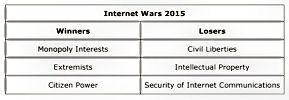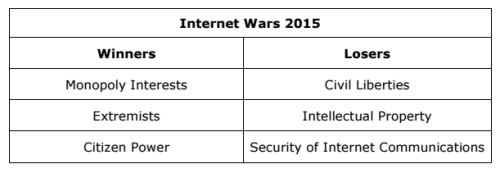New book: Internet Wars by Fergus Hanson

 One of the most critical emerging power struggles of the 21st Century is taking place – the battle to control the Internet. The Internet offers up the opportunity for exercising extraordinary political, economic, and military power. Already exploitation of this super-network has helped create the world’s most valuable company, toppled governments, led to the largest wealth transfer in history, and created the most extensive global surveillance system ever So who won the Internet Wars in 2015? E-diplomacy expert and author of the recently released Internet Wars Fergus Hanson has delivered the verdict.
One of the most critical emerging power struggles of the 21st Century is taking place – the battle to control the Internet. The Internet offers up the opportunity for exercising extraordinary political, economic, and military power. Already exploitation of this super-network has helped create the world’s most valuable company, toppled governments, led to the largest wealth transfer in history, and created the most extensive global surveillance system ever So who won the Internet Wars in 2015? E-diplomacy expert and author of the recently released Internet Wars Fergus Hanson has delivered the verdict.
 Here are the winners and the losers for 2015 Internet Wars 2015 Winners Losers Monopoly Interests Civil Liberties Extremists Intellectual Property Citizen Power Security of Internet Communications Hanson said 2015 was the year a handful of tech titans consolidated their growing control of key economic chokepoints online, making Monopoly Interests the clear winner in 2015.
Here are the winners and the losers for 2015 Internet Wars 2015 Winners Losers Monopoly Interests Civil Liberties Extremists Intellectual Property Citizen Power Security of Internet Communications Hanson said 2015 was the year a handful of tech titans consolidated their growing control of key economic chokepoints online, making Monopoly Interests the clear winner in 2015.
“In 2013, two tech titans made it into the Fortune 500 top 10 by market “In 2015, there were three in the top five and four in the top 10.
“Apple, the world’s most valuable company, was worth about twice as much as the next two largest companies combined.
“Companies like Apple, Google and Facebook are securing control over key economic chokepoints online.
“This is not to suggest smaller companies will disappear from the Internet, just that to do business, they’ll have to operate through these titans,’ he said.
Hanson said 2015 was also the year extremists ran roughshod over the West “The world’s most powerful militaries, their sophisticated intelligence services and vast financial resources were outmanoeuvred by a relatively tiny number of degenerate fanatics,” said Hanson.
Meanwhile, in the US, the Internet Wars of 2015 have seen the shake up of the Presidential election like never before, shining a light on the aggregating power of the Internet for ordinary citizens.
“Republican voters have flocked in droves to outsider candidates Donald Trump and Ben Carson while, in the Democratic campaign, Hillary Clinton has faced surprisingly strong competition from Bernie Sanders,” said Hanson.
Civil liberties, intellectual property and security of Internet communications are all under siege online, with Hanson declaring them all losers in 2015.
Hanson said the Internet might have extended free speech to many, but in the big picture it has been a double-edged sword.
“Companies like Facebook, with one fifth of the world as users, has begun to exercise an important role as the new moral guardian.
“Its leaked censorship guidelines from 2012 revealed it forbade breastfeeding but gave the thumbs up to crushed heads,” he said.
So is peace possible online?
Hanson said, as a global commons, the Internet will always be open to abuse by individuals, companies, and governments.
“But if broad rules of the road can be agreed, breaches can become the exception rather than the norm, allowing the most important features of the Internet to be preserved.
“This is not an overnight fix. The first step is recognising the turning point we have reached, the critical importance of what’s at stake, and the need to act.
“As an advanced economy and open democracy Australia has a critical interest in securing the Internet’s immense promise into the future.
“Australia should develop a digital foreign policy that identifies our core economic, social and security interests and engage in leading global debates,” he said.

Recent comments